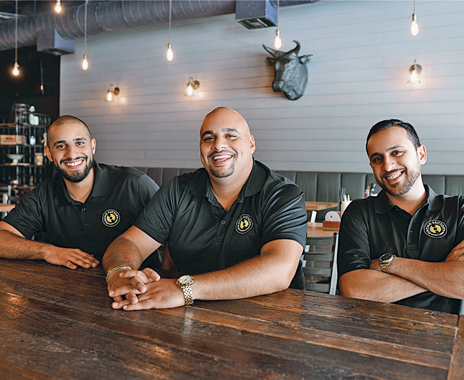Family members, spouses, or close friends who start a concept together can enjoy unmatched levels of trust between partners that is rarely seen in the business world.
This inherent trust can then lead to monumental success. But going into business with one’s family or friends also presents a number of pitfalls that all too many businesses encounter.
Dean Small is president of Synergy Restaurant Consultants, which has worked with multiunit family-owned businesses in the past. He says he has seen some family- and friend-owned businesses fail and bridges burned between relatives and close friends when a solid plan is never developed to guide the company.
“When there is a clear vision of what the restaurant is all about … then everybody rallies around that vision,” Small says. “When you fail to go through that exercise, what you have is a disenfranchised family member or sibling or friends because they don’t feel their voice has been heard.”
A matter of trust
While a detailed business plan may be necessary to move forward, the initial idea to start a company together can be far more spontaneous. Many success stories of such startups were conceived in humble beginnings.
After a few too many shots of tequila during a July 4th cookout, brothers Nedal and Nizar Ahmad, along with their cousin Otto Othman, crystalized their idea for Pincho Factory, a growing South Florida concept that serves burgers and pinchos, a Spanish take on kebabs. Othman says it all began when he and his cousins joked about starting a restaurant that combined Nedal’s great burgers and pinchos adapted from Othman’s grandmother’s kebabs.
Othman and the Ahmad brothers say they never dreamed that Pincho Factory would catapult to success as it has. The brand has netted multiple accolades—most recently a People’s Choice Award from Food Network’s South Beach Wine & Food Festival’s Burger Bash—and the founders hope to open 50 Pincho Factory stores through a growing franchise plan by 2018.
CEO Nedal Ahmad says Pincho Factory was only made possible through the support of his family. Othman helped Ahmad finance the first Pincho Factory in 2010 when he had just $6.27 left in his bank account after the birth of his daughter.
Othman, CMO of the company, says he didn’t mind financing the business with upward of $30,000 of his own money. He says he completely trusted Ahmad and believed in the idea of the business, although their parents “thought we were crazy.” Othman says that initially, building a brand was more important than any immediate return in profits.
“I always told Nedal and Nizar, had we had gone into business with other people or investors that demanded returns and demanded some sort of reporting on a weekly basis and there was no trust, we would have never been a company today,” Othman says.
Othman and the Ahmad brothers say the single most integral reason for their triumph as business partners is the trust they have in each other.
The other? Knowing how to fight right. Othman says it’s important to not let egos barge into the conversation; listen and know when you’re wrong, he says.
Playing to each other’s strengths
CREAM, a fresh-made ice cream sandwich concept, is another company that found success by keeping things in the family.
Jimmy Shamieh is CEO of CREAM (Cookies Rule Everything Around Me) and his son, Gus, is president. Shamieh’s wife, Wafa, is in charge of new product development, and no new item makes it onto the menu without her seal of approval. It makes sense, considering her home-baked cookies were a childhood treat for the family and are the inspiration for the store’s core concept. The Shamiehs’ daughter, Tagreed, is general manager of the family’s original store in Berkeley, California.
Jimmy and Gus Shamieh say starting CREAM helped pull their family out of the economic recession pre-2010. “Jimmy and my mom would open in the mornings, and my sister and I would come at night and take over the night shift,” says Gus Shamieh of CREAM’s first few months. “We’d close late and stay to clean after.”
Now the brand counts about a dozen units (including franchisees) in its system.
Jimmy Shamieh jokes that one of the challenges of being in a family business is that one cannot fire family, “even though you would love to do that sometimes.”
“On a serious level, though, the difficulty is that you’ve got to be with this person almost 24 hours a day, and sometimes the work issues are taken home,” he says. “There are no office hours where from 8 a.m. to 5 p.m. you work and then you go home to a totally different environment.”
The Shamiehs say valuing each family member’s input is not just important, but also good for business as a variety of perspectives from different ages, genders, and worldviews can help a company’s bottom line.
Jimmy Shamieh recalls a significant disagreement he and Gus had early on about marketing; Gus believed social media was the way to go, while Jimmy advocated for radio and print advertising.
Gus eventually won, and Jimmy says he was “happily” proved wrong. CREAM now has 22,000 Instagram fans and sees great success through its social media endeavors.
A little bit of friendly competition
Friends Matt Friedman and Adam Scott were brothers in the same fraternity at the University of Florida in 1991 when they started a quick-service hot wing delivery business in their fraternity. Nearly a quarter of a century later, Wing Zone has almost 100 locations around the world.
Friedman, CEO of Wing Zone, says he and Scott, who is CFO, are still incredibly close after “22 years as business partners and probably 25 years of being friends.” Friedman says the two spend roughly 30–40 hours a week together in the office.
The two friends spend time together outside of work, too; they attend each other’s family events and compete in sports. Friedman says that while greed can kill business relationships, a little rivalry can actually help because they aren’t afraid to challenge each other’s ideas, which generally leads to more refined plans.
Friedman says that despite this small rivalry, the two have only had about five major arguments about business practices in their 22 years as partners. He adds that it’s important to respect your partner’s perspective in those situations.
Those who want to go into business together should draft a business plan early on to differentiate responsibilities between partners, he adds. Signing a partnership agreement, even when working with a friend as a partner, is necessary. It also helps to play to each partner’s strength.
“My focus is on the food operation and marketing side, and Adam’s core competency really deals with the financial side and the legal aspects and all of the IT,” Friedman says. “We like to say that we stay out of each other’s sandboxes, and, [as a result], it’s been really an incredible partnership.”
Relationships that go deeper than business can create a company culture where customers, employees, and franchisees are treated like another member of the family. Nedal Ahmad adds that there is another bonus to being in a family-run company.
“At least for me, the greatest part about this [business] is that I get to work with my best friends every single day,” he says.













